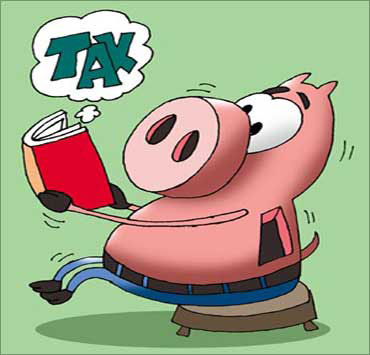 | « Back to article | Print this article |
Direct Tax Code: What does it mean to tax savers?
The Direct Tax Code (or DTC) has recently been proposed by the Government of India, to bring about a change in the whole taxation system of the country. The new tax code aims to make the system more efficient and easy for tax payers, with simplified rules and regulations. It is a step towards replacing the four decade old Income Tax Act of India.
The new DTC would impact both individuals as well as corporate with changes in taxation slabs, Public Provident Funds, insurance policies, home loans, mutual funds and shares.
Drafts of the DTC
The first draft: The Finance Minister floated the first draft of the DTC in August 2009 and kept it open for public comments. Here is a peek on a few of the proposals made in the first draft:
- Proposal to exempt tax if income is Rs 1.6 lakhs in a year. The tax slabs further would be 10 per cent from Rs 1.6 lakhs to Rs 10 lakhs, 20 per cent between Rs 10 lakhs and Rs 25 lakhs, and 30 per cent above Rs 25 lakhs
- Deduction levels for savings raised to Rs 3,00,000
- Wealth tax to be levied on wealth over Rs 50 crore
- Proposal of a uniform corporate tax rate of 25 per cent
- Securities transaction tax abolished
The revised draft of the DTC
Further to the 1,600 comments received, the second draft of the DTC was floated recently. It brought certain changes in retirement schemes, home loans and capital gains, to name a few.
DTC revised draft: What it offers investors
The second draft of the DTC is much simpler and offers investors a whole deal of exemptions, unlike the first draft. The revised draft was aimed towards promoting long term savings.
Click NEXT to read a few of the proposals for investors
Capital gains tax
Equity: Investments in shares and equity based mutual funds would now be taxed using a new concept of 'Deduction' instead of the earlier Indexation method.
Certain deductions will be applied to long term capital gains of one year and above. This would be a percentage of the profits earned. After the deductions are made, the balance amount would be added to the income and then taxed at applicable rates. Currently there is not much clarity on the percentage of deduction. Also, the holding period of shares, as of now, will be one year, from the end of the financial year, when the shares were bought.
For short term capital gains of less than one year, the entire amount will be included as a part of the income and taxed at applicable rates.
Debt, gold and real estate: Capital gains of less than a year, from gold, gold ETFs, debt and real estate investments would be added to the taxable income, and normal slabs would apply. For all capital gains of more than a year old, gains will be added to the taxable income after adjusting for indexation benefit.
The base date for indexation values would however now be shifted to April 1, 2000 instead of the earlier April 1, 1981.
Click NEXT to read what is exempt from tax and what is not
Life insurance policy, pension or annuity plans and provident funds
All pure life insurance policies, pension or annuity plans, PPF and EPF would come under 'EEE' and not 'EET' structure. This means that it would be completely tax free.
Understanding 'EEE' and 'EET'
EEE: Amount invested or contributed would be 'Exempt', the returns or the interest generated would be 'Exempt' and lastly the final maturity amount would also be 'Exempt' from tax.
EET: Amount invested or contributed would be 'Exempt', the returns or interest would be 'Exempt', but the final maturity amount would be 'Taxed'.
This proposal of EEE status for all retirement products would prove beneficial to pensioners and senior citizens. The first draft of the DTC included such schemes under 'EET' Status.
Click NEXT to read more...
ULIP's and endowment plans
The DTC includes ULIPs and endowment plans under EET. The money received on maturity from such plans would now be taxed.
Tax on rental income: Tax would be applicable only on the actual rent received for the house. So, if there is no rental income earned, no tax is to be paid.
Earlier, it was proposed that tax was to be paid even if your house was not rented, by considering a notional rental amount.
Home loans: The interest on home loans would be exempt up to Rs 1.5 lakhs. However, the principal portion would now not be covered under section 80C. The first draft had proposed to remove all tax benefits on home loans, both on the principal and the interest. This has now been changed, bringing a relief for all home loan borrowers.
The crux of the DTC is to introduce moderate levels of taxation, expand the tax base and check tax evasion. There is however some areas which still require clarity.
The actual bill is still to be introduced in the parliament, and by this time we may probably see further amendments. It is expected to come into being by April 2011.




